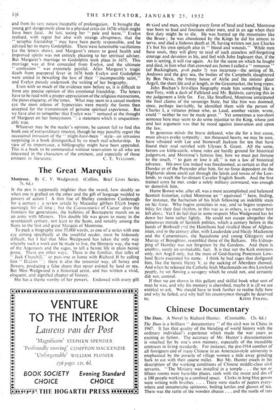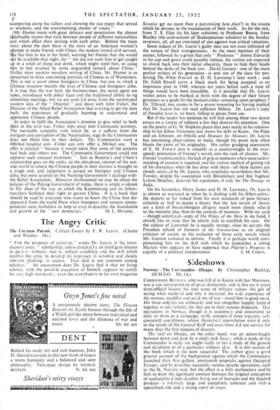Chinese Documentary The Dam. A Novel by Richard Hunter. (Constable.
12s. 6d.)
The Dam is a brilliant " documentary " of the civil war in China in 1947. it has that quality of the blending of world history with the ordinary individual's experience which made the war years as exciting as fiction. The accuracy of Mr. Hunter's documentation is vouched for by one's own memory, especially of the incredible contrasts in living standards. For instance, the pre-1914 comfort of all foreigners and of many Chinese in an American-style university is emphasised by the poVerty of village women a mile away grinding bark to eat with their coarse millet. But Mr. Hunter excels in his description of the working conditions of Chinese middleclass civil servants. "The Ministry was installed in a temple . . . the ten or fifteen rooms were barn-like places, rank with the sweat and din of a 100 people working in a confined space. Clerks in long blue gowns were writing with brushes. . . . There were stacks of papers every- where and innumerable spittoons, boiling kettles and glasses of tea. There was the rattle of the wooden abacus . . . and the rustle of rats scampering along the rafters and chewing the rice paper that served as windows, and the overwhelming chatter of voices."
iMr. Hunter treats with great delicacy and penetration the almost iridefinable strains that exist between people of different nationalities and which affect their dealing with each other. Behind the main story about the dam there is the story of an American woman's 4tempt to make friends with Chien, the student turned civil servant.
e has him to tea in her hotel, warning her friends that she would nit be available that night, for " she did not want him to get caught up in a whirl of slang and drink, which might repel him, or cause him to feel insulted by some unguarded remark about China." Unlike most western novelists writing of China, Mr. Hunter is as concerned to draw convincing portraits of Chinese as of Westerners. This is not a novel about foreigners in China, but one in which a ahinese situation moulds the lives of Chinese and foreigners alike. If is true that the war lord, the business-man, the secret agent are types, introduced with poker faces and the traditional ability to rig committee meetings, but we are soon led away from the stereotyped western idea of the " Oriental," and share with John Fisher, the Director of the Allied Relief Association that is,trying to get the dam built, the experience of gradually learning to understand and appreciate Chinese people.
In order to fulfil the Association's promise to give relief to both Ades in the civil war, Fisher slips away into Communist territory. The inevitable sympathy with which he, as a sufferer from the intrigues and corruption of the Nationalists, rega-ds the Communists does not blind him to their defects. The Communists want a 600-bed hospital unit—Fisher can only offer a 200-bed one. The offer is rejected " because it would mean that some of the patients had beds and others not. The Communist Government could not approve such unequal treatment." Just as Rosetta's and Chien's relationship goes on the rocks, so the chivalrous attempt of the out- side world to relieve the Chinese people in their distress is brought to a tragic end, and judgement is passed on foreigner and Chinese alike, but most severely on the Nanking Government's dealings with- the Relief Association. However disillusioned we may be about the 'policies of the Peking Governinent of today, there is ample evidence in The Dam of the way in which the Kuomintang and its fellow- travellers forfeited their right to govern China. It is a book that should be read by everyone who wants to know the China that dis- appeared from the world Press when foreigners and western corres- pondents were forbidden to help or even to describe the foundation
and growth of the " new democracy." M. L. HUGHES.



































 Previous page
Previous page